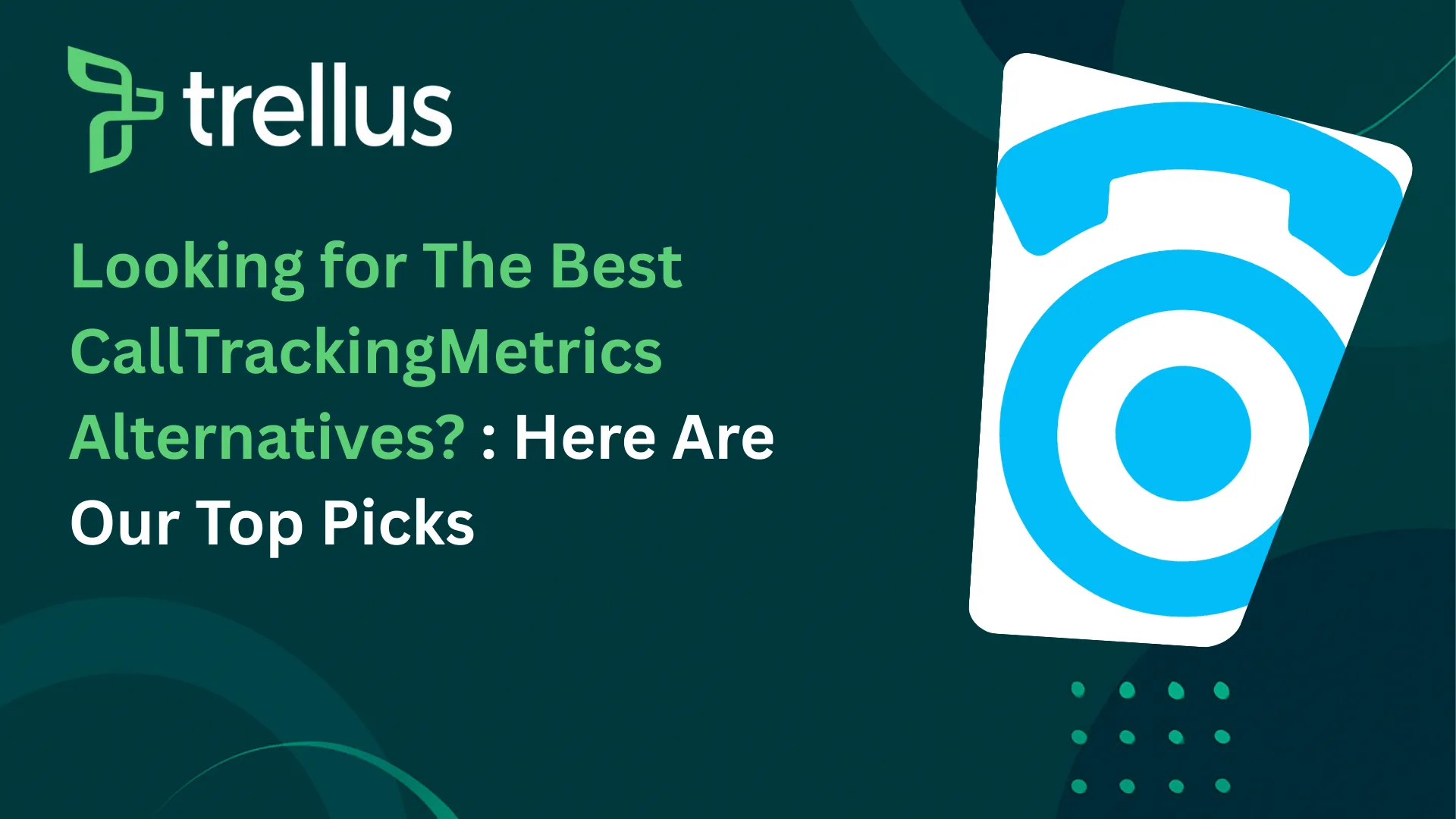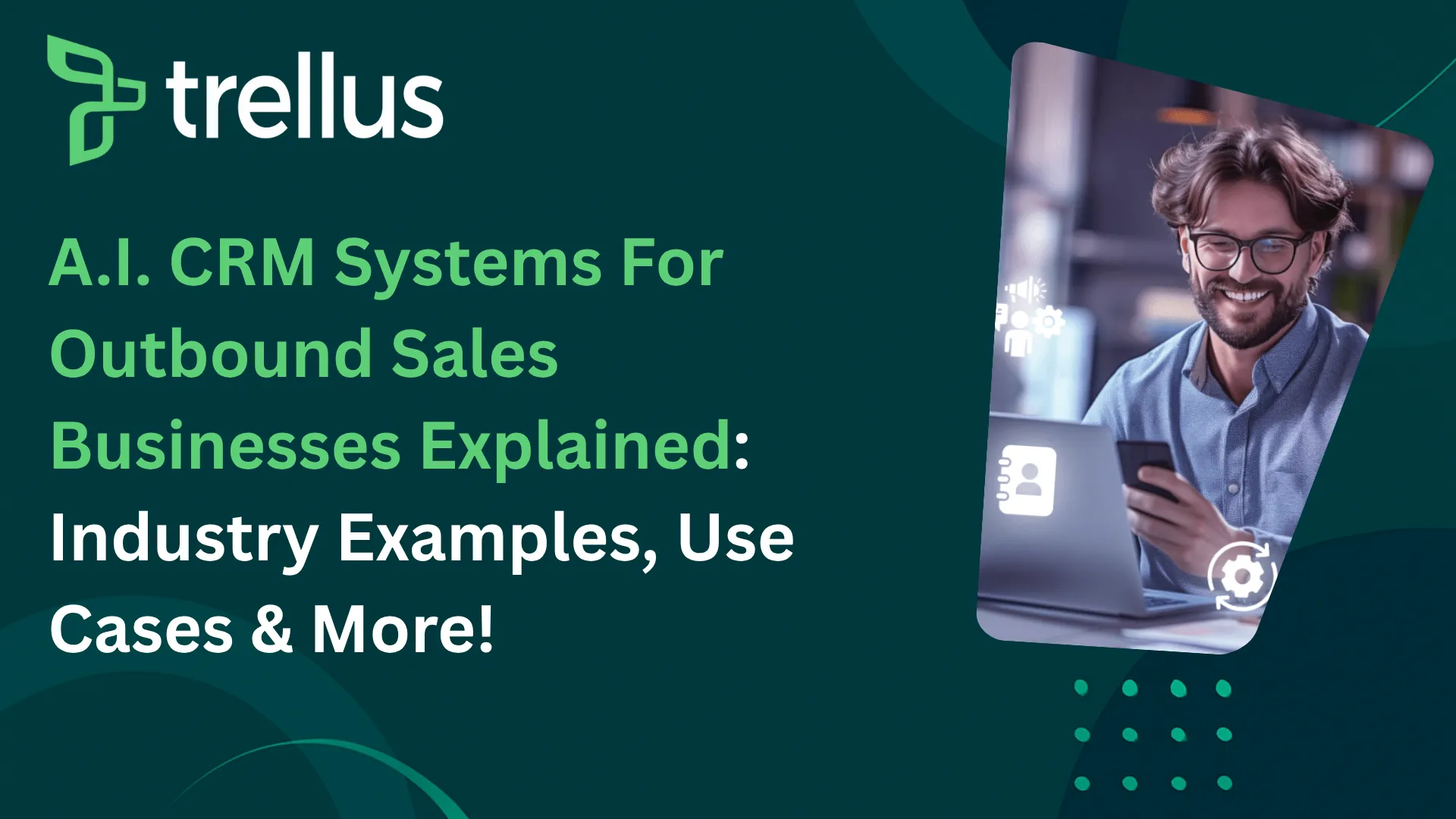
Our Top Picks


Some of the biggest brands like Shopify, Airbnb and Instacart are using AI CRM Systems internally to gain a competitive advantage. Through my time at Trellus, I've uncovered some of the best AI CRM software solutions on the market today (and listed them below).
It's pretty obvious that Aritificial Intelligence has taken not only the marketing faternity by storm, but the tech industry in general.
Is it all plomp and show?
Will we see bubble burst like we did 25 odd years back?
It's tough to tell right now but one thing I'm certain about right now is that AI CRM Systems is the future of how businesses manage and enhance sales efficiency and decision making.
While AI today is simply just complex machine learning, the future of AI Marketing is bright.
I've been constantly testing and using different AI CRM Systems over the past 2 years due to the nature of my job, and every now and than I come to this article to update it with any tools I believe deserve to be listed in it.
If you look at some other posts on this subject, you'll discover they have been copying my content and trying to feed you a bunch of results influenced by affiliate commissions.
But this post is different.
These are tools that I've actually used in my work capacity at Trellus.
Alright, let's go over some of the best tools and how I think AI can be applied to different areas of your cold calling stack.
What Is an AI CRM System and Why It Matters
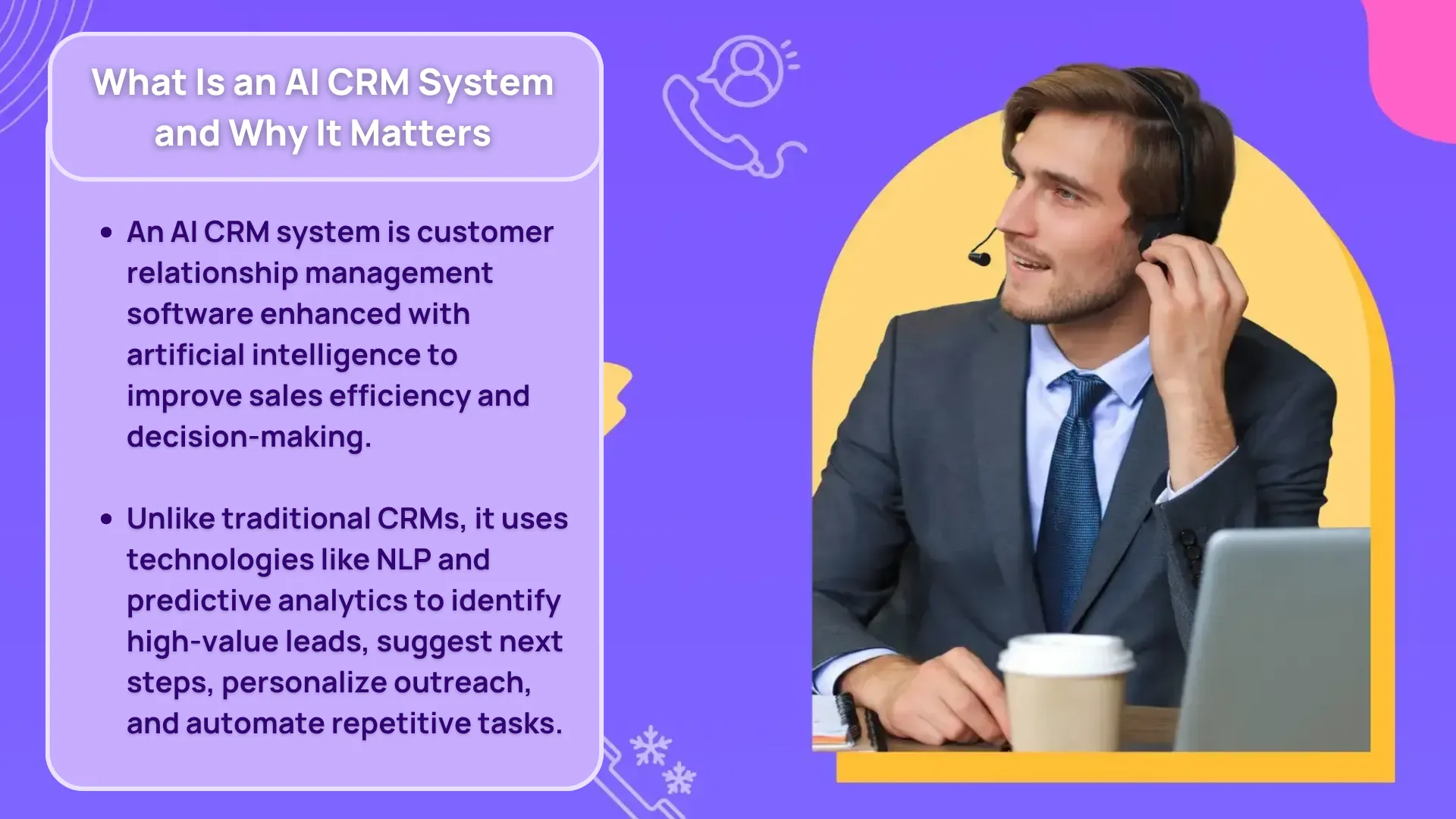
An AI CRM system refers to customer relationship management software that incorporates artificial intelligence to streamline, optimize, and enhance sales processes. Traditional CRMs store customer data. But AI-based CRM systems do more, they learn from that data and help sales reps make smarter decisions without needing to analyze data themselves.
Whether it's through natural language processing (NLP), predictive analytics, or machine learning models, the combination of CRM and artificial intelligence allows organizations to:
- Stronger team focus: In 2026, liberate teams from repetitive "grunt work" through workflow automation and AI Tools. By automating predictable, rule based tasks teams can save 30-40% of their time. Based on my experience of working with multiple CRMs a great strategy for implementation.
- Audit Workflows - Have teams log work for 3-5 days to identify tasks that are frequent, rule based and manual.
- Start Small - Chose one high volume, low complexity task for a pilot project.
- Use Templates - Leverage pre built templates provided by platforms like Zapier or Lindy to deploy automations in minutes.
- Measure Success - Track metrics like hours saved, error reduction and employee satisfaction to justify the initiative.
- Smarter Data: AI-driven CRM systems have transitioned from simple databases into "decision-making engines". By automating data hygiene and providing real-time intelligence, these systems ensure that organizations operate on high-quality information rather than intuition.
- Reduced Human Error & Automated Hygiene: AI eliminates the "garbage in, garbage out" problem by automating manual data entry and continuously cleaning records. It standardizes inputs and automatically weeds out redundant, obsolete, and trivial (ROT) data.
- Marketing & Conversion Lift: AI-driven lead scoring and personalization can increase lead conversion rates by 20% to 30% and boost marketing click-through rates by as much as 450% through iterative learning models.
- Revenue Growth: In 2025, 83% of sales teams using AI reported revenue growth, compared to only 66% of teams without it. On average, AI CRM adoption drives a 25% increase in sales revenue.
- Lower operational costs: AI CRM systems lower operational costs by transforming the CRM from a passive database into an active, self-managing engine. By automating labor-intensive processes, businesses can achieve significant cost savings and efficiency gains.
- Elimination of Administrative Drudgery: AI automates manual data entry, meeting note-taking, and record updates, which historically consume up to 30% of a sales team's time.
- Support & Customer Service Savings: I've worked with multiple businesses and they have seen Implementing AI chatbots for customer support can reduce support costs by 25%.
The AI CRM platform becomes an intelligent assistant, silently working in the background to keep everything running efficiently.
How CRM and AI Combine to Elevate Sales Teams
I remember the days of manually sifting through spreadsheets and relying on gut feelings to prioritize leads. It was a grind, and honestly, a lot of potential revenue slipped through the cracks. Fast forward to today, and after two years of immersing myself in the world of AI-powered CRMs, the difference is night and day.
Imagine this: instead of your sales team spending over half their time just crafting messaging, an AI assistant drafts personalized outreach in seconds. That's not science fiction; it's the reality I've witnessed with the systems I've reviewed.
We're seeing a massive shift in the industry, with 56% of sales professionals now using AI daily and, as a result, being twice as likely to crush their sales targets . It's a story I've seen play out repeatedly. A talented but overwhelmed sales team is suddenly unshackled from the administrative burdens that used to eat up their days.
They're no longer guessing which leads to focus on; the AI is serving up the hottest prospects on a silver platter. It's a transformation from a reactive, often chaotic process to a proactive, data-driven machine. And the best part? It's not just for the enterprise giants anymore.
A whopping 75% of small businesses are already investing in these tools , leveling the playing field in a way I've never seen before.
Real-World Applications of AI-Based CRM
So, we've talked about the high-level benefits, but what does this look like on the ground, day-to-day?
After spending two years in the trenches with seven different AI CRMs, I can tell you it’s less about futuristic robots and more about practical, revenue-driving intelligence. One of the most impactful applications I saw was predictive lead scoring.
Instead of my reps manually ranking leads based on gut feelings, the AI did the heavy lifting. It analyzed thousands of data points; website visits, email engagement, firmographic data, and served up a prioritized list of who to call first.
I saw leads with a 95% conversion probability bubbled to the top simply because the AI knew they matched our ideal customer profile and had just visited the pricing page for the third time.
That’s a conversation you want to have now.
Another game-changer was AI-powered communication. The systems I tested could draft entire email sequences, but the real magic was personalization at scale.
The AI would pull a recent LinkedIn post from a prospect or a company funding announcement and weave it into the opening line of an email. In one of my A/B tests, the reply rate on these AI-personalized emails was nearly double that of our best-performing templates.
Finally, there’s deal health monitoring. One of the CRMs acted like a sixth sense for our pipeline, flagging a major deal as ‘at risk’ because communication from the prospect had dropped 50% in two weeks. We were alerted, re-engaged, and saved a deal that would have otherwise silently slipped away.
This isn’t just theory; it’s about putting tangible, pipeline-protecting tools directly into your team’s hands.
7 AI CRM Tools Powering Modern Sales Teams
I’ve seen firsthand how the right AI CRM can transform a sales team from reactive order-takers to a proactive revenue engine. But with every vendor slapping an “AI” sticker on their platform, how do you separate the game-changers from the gimmicks?
I’ve put seven of the top contenders through their paces, and while each has its strengths, they all share a common thread: they automate the mundane to create space for meaningful, human-led selling.
From the enterprise-grade power of Salesforce Einstein to the all-in-one simplicity of HubSpot’s Smart CRM, the options are vast.
For those on a budget, Zoho’s Zia offers impressive AI features without breaking the bank, while Pipedrive and Freshworks deliver practical, easy-to-use automation for smaller teams.
For outbound-heavy teams, Close excels at streamlining communication, and for those seeking a modern, flexible interface, Attio is a compelling newcomer.
In this review, I’ll break down the pros and cons of each, sharing my honest take on where they shine and where they fall short. We’ll move beyond the marketing hype to give you the real story on how these tools perform in the wild.
1. Salesforce Sales Cloud
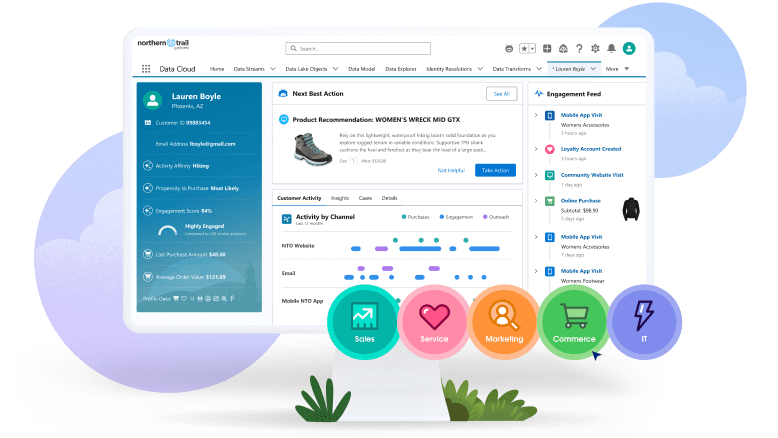
Salesforce isn’t just a CRM; it’s an entire ecosystem.
After testing it throughly, I can say with confidence that it’s the most powerful and comprehensive platform on this list, but that power comes with a significant learning curve.
When you step into Salesforce, you’re not just adopting a tool; you’re adopting a new way of operating. Its AI, a combination of Einstein and Copilot, is deeply embedded and incredibly robust.
In my testing, Einstein’s predictive lead scoring was consistently the most accurate, surfacing opportunities my team would have otherwise missed.
I found its forecasting capabilities to be second to none, providing a level of pipeline visibility that other platforms couldn’t match. However, getting it to that point required a dedicated administrator and a significant time investment.
It’s not a plug-and-play solution, but for those willing to put in the work, the payoff is immense.
Whose it for: Large, enterprise-level companies that need a highly customizable, scalable, and data-driven CRM. It’s particularly well-suited for organizations that already use other Salesforce products or have dedicated IT/admin resources to manage the platform.
Why I Choose it: For its sheer power and extensibility. No other CRM I tested offered the same depth of analytics, customization, and third-party integrations. If your goal is to build a truly bespoke sales machine and you have the resources to do it, Salesforce is the undisputed king.
Pricing: Core plans range from $25 to $80 per user/month, but don’t let that fool you. The real power lies in the AI add-ons (Einstein + Copilot), which can easily push the total cost to over $150 per user/month.
Pros:
•Unmatched analytics and forecasting capabilities.
•Massive integration ecosystem (the AppExchange).
•Infinitely customizable to fit any sales process.
Cons:
•Extremely expensive, with AI features costing extra.
•Steep learning curve requiring dedicated admin support.
•Can feel bloated and overly complex for smaller teams.
2. HubSpot Smart CRM
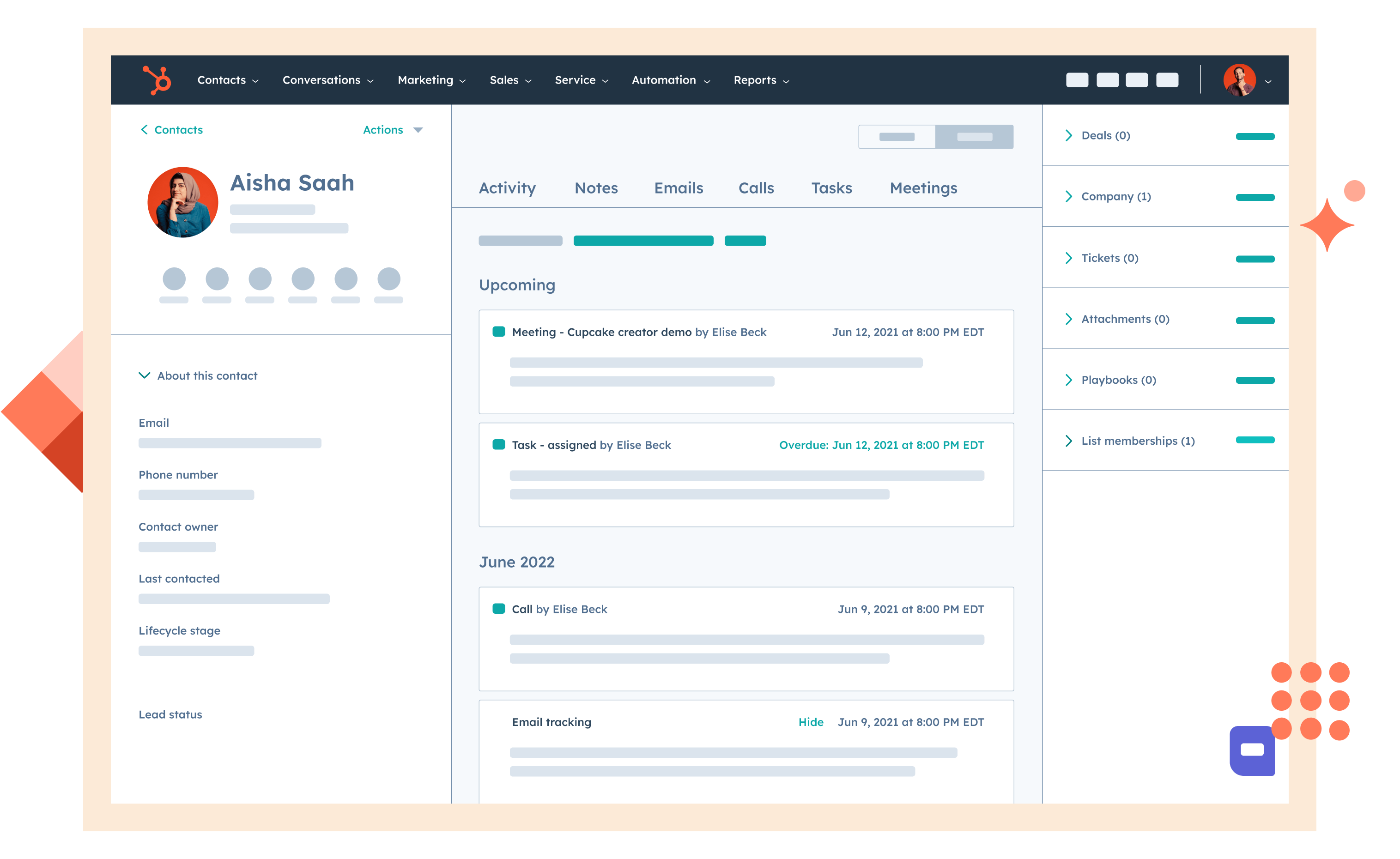
If Salesforce is the powerful, complex enterprise solution, HubSpot is its user-friendly, all-in-one counterpart.
After years of testing, I see HubSpot as the great democratizer of CRM technology. It’s designed from the ground up for usability, and its AI features follow the same philosophy.
While its “Smart CRM” may not have the sheer analytical depth of Salesforce’s Einstein, its strength lies in practical, everyday application.
I found its AI-powered workflow automations to be incredibly intuitive, allowing my team to set up automated follow-ups and lead nurturing sequences in minutes, not days.
The AI assistant for drafting emails and summarizing interactions was a consistent time-saver, genuinely reducing the administrative load on my reps. It’s the perfect example of how AI can make a team more efficient without requiring a data science degree to operate. It excels at aligning marketing and sales teams around a single source of truth.
Whose it for: Small to midsize businesses (SMBs) and service-based companies that want a reliable, all-in-one platform for marketing, sales, and customer service. It’s perfect for teams that prioritize ease of use and quick adoption over deep, complex customization.
Why I Choose it: For its unbeatable user experience and integrated platform. It’s the best choice for teams that need to align their marketing and sales efforts seamlessly and want a system that reps will actually enjoy using. The free CRM is a fantastic entry point, and the value it provides out of the box is unmatched.
Pricing: HubSpot offers a robust free plan. Paid plans with more advanced AI features start around $20 per seat/month and scale up to $90+ for Professional and Enterprise tiers.
Pros:
•Extremely user-friendly and easy to onboard new team members.
•A true all-in-one platform that aligns marketing, sales, and service.
•Powerful automations that are simple to build and genuinely reduce manual work.
Cons:
•The best AI features are locked behind the more expensive Pro and Enterprise tiers.
•AI insights can feel basic compared to more advanced, enterprise-focused systems.
•Contact-based pricing can become expensive as your database grows.
Supercharge HubSpot with Trellus.ai
While HubSpot is fantastic for managing customer data, you can elevate your team’s performance by integrating a real-time AI sales coach like Trellus.ai.
Think of it this way: HubSpot manages the what (the leads, the deals, the data), while Trellus.ai perfects the how (the conversation).
Layering Trellus on top of HubSpot created a powerful feedback loop. Trellus provides live guidance during sales calls; helping reps navigate objections and stick to the playbook and then automatically syncs call summaries and outcomes back to the HubSpot contact record, enriching your CRM with invaluable conversational data.
3. Zoho CRM (with Zia)
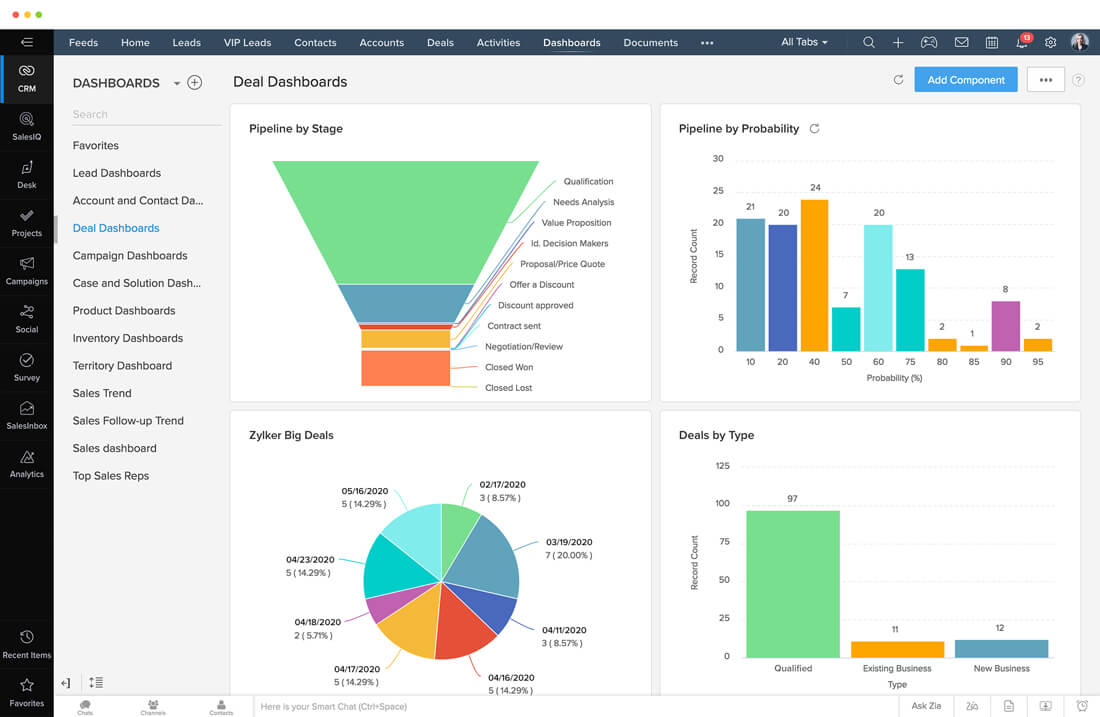
When it comes to getting the most bang for your buck, Zoho CRM is in a league of its own.
My time with the platform revealed it to be the Swiss Army knife of CRMs—it has a tool for just about everything. The secret sauce is Zia, its AI assistant, which works quietly in the background to automate tasks and surface insights.
While it might not have the intimidating presence of Salesforce’s AI, Zia is surprisingly practical.
I found its ability to suggest the best time to contact a lead and to flag emails with negative sentiment genuinely useful for prioritizing my team’s day.
What really sets Zoho apart, though, is its sprawling ecosystem. With over 100 million users across its business apps, it has built a deeply integrated suite where your CRM, email, accounting, and project management can all talk to each other seamlessly.
It’s this interconnectedness that creates its true power.
Whose it for: Budget-conscious SMBs and startups that want a feature-rich CRM and are open to adopting a full suite of business applications. It’s a perfect fit for teams that value an all-in-one solution over a best-of-breed, multi-vendor approach.
Why I Choose it: For its incredible value proposition. You get a powerful, AI-enabled CRM that integrates flawlessly with dozens of other business tools, all for a fraction of the cost of its competitors. If you’re willing to go all-in on the Zoho ecosystem, the synergy is undeniable.
Pricing: Zoho’s pricing is highly competitive, with plans starting around $20 per user/month. The most powerful Zia features are reserved for the Enterprise and Ultimate editions, but even these are remarkably affordable compared to the rest of the market.
Pros:
•Extremely budget-friendly for the features offered.
•AI works out of the box with minimal setup required.
•Unbeatable integration with Zoho’s comprehensive suite of business apps.
Cons:
•The user interface can feel a bit dated and less intuitive than modern rivals.
•Zia’s AI insights can be less reliable with smaller, incomplete datasets.
•Customization and integrations are somewhat limited if you venture outside the Zoho ecosystem.
4. Pipedrive
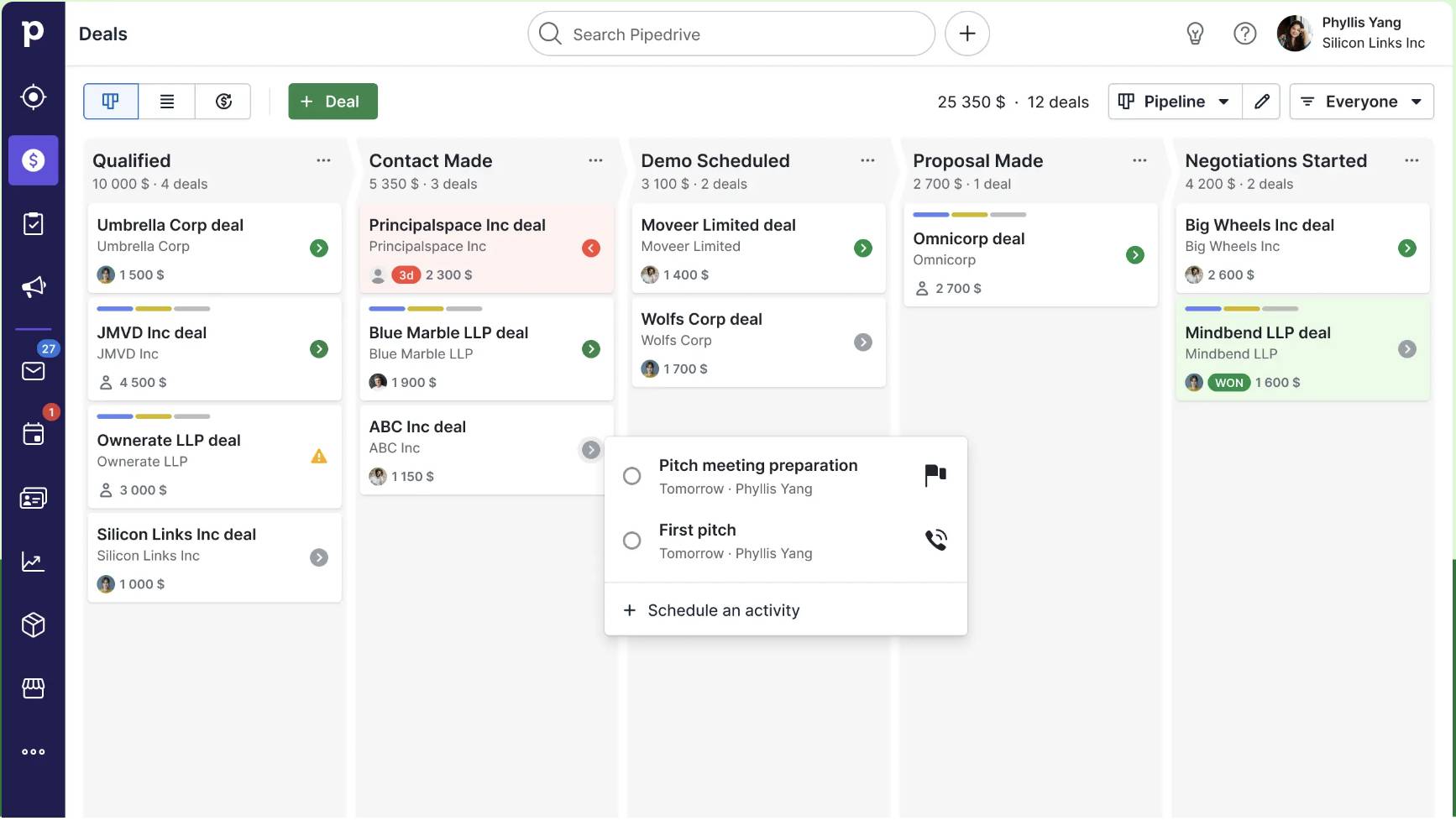
If you believe a CRM should help you sell, not create administrative headaches, then Pipedrive will feel like a breath of fresh air.
My experience with it was a lesson in focused design. It’s built around a single, powerful concept: the visual sales pipeline. This drag-and-drop interface is incredibly intuitive, and it’s where Pipedrive’s AI Sales Assistant comes to life.
Rather than trying to be an all-knowing oracle, the AI acts as a practical sidekick, nudging reps with smart suggestions for the next best action and flagging deals that have gone cold. It’s this laser focus on the sales process that has earned it a loyal following of over 100,000 companies.
While it lacks the sprawling feature set of a Salesforce or Zoho, it makes up for it with a clean, uncluttered experience that keeps your team focused on one thing: closing.
Whose it for: Small sales teams and service businesses that need a straightforward, visual CRM that gets out of the way and lets them focus on selling. It’s ideal for teams that don’t have a dedicated CRM administrator.
Why I Choose it: For its unapologetic simplicity. It’s the best tool on the market for teams that want to visualize their sales process and get actionable insights without getting bogged down in complexity. It’s designed for salespeople, by salespeople, and it shows.
Pricing: Plans are very approachable, starting at just $14 per user/month. As with others, the more advanced AI features are reserved for the higher-tier plans like Advanced and Professional.
Pros:
•Incredibly easy to learn and navigate, thanks to its visual pipeline.
•Quick to set up, making it perfect for teams without dedicated IT support.
•Affordable pricing structure with a solid mobile app experience.
Cons:
•The AI insights are more practical than predictive, lacking the depth of enterprise systems.
•Reporting and analytics are limited compared to more robust CRMs.
•Key integrations and more advanced automations often require paid add-ons.
5. Freshworks (Freddy AI)
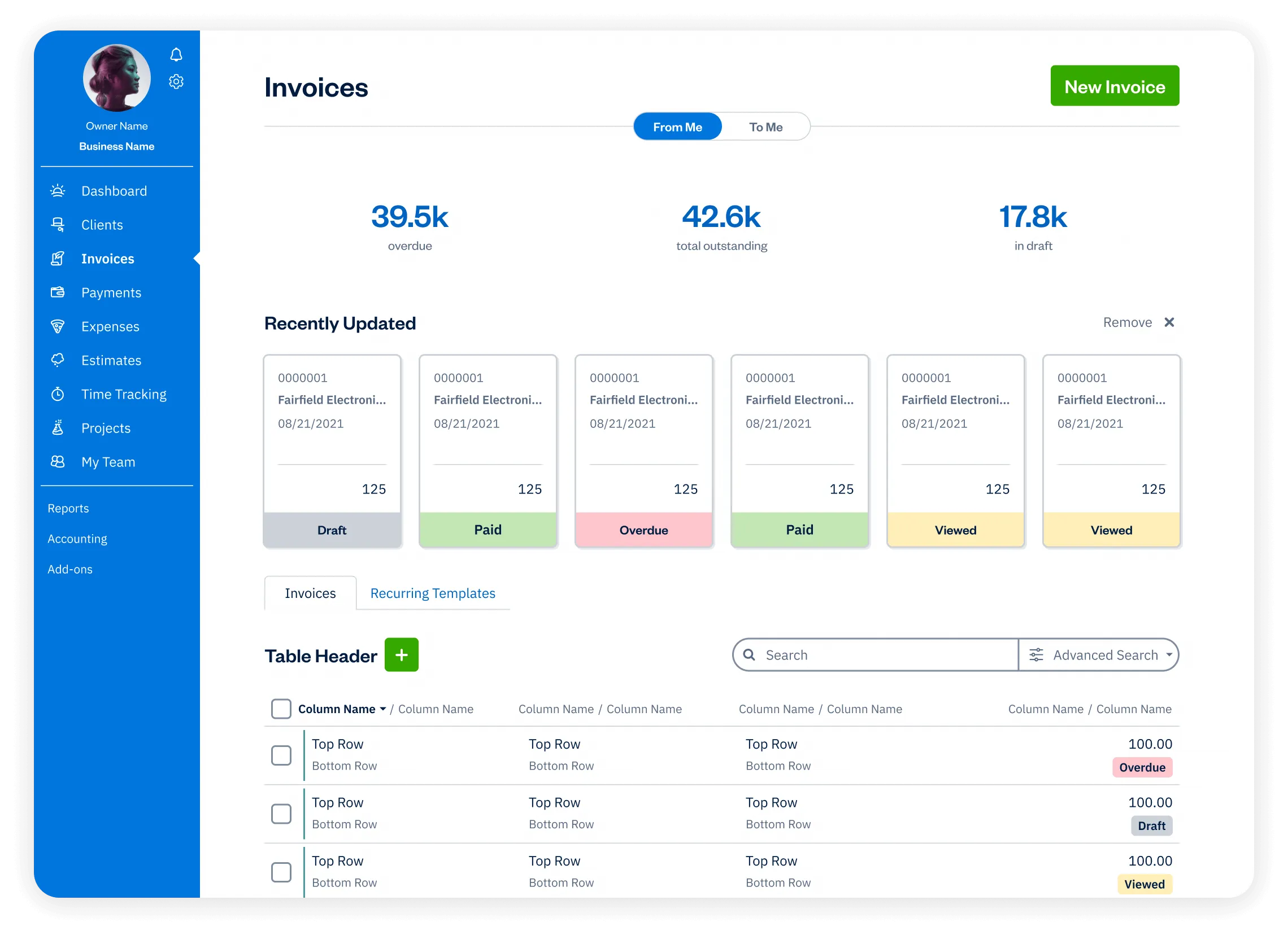
Freshworks feels like it was built for the fast-moving SMB that needs to consolidate its tech stack without breaking the bank. My time with the platform showed me it’s a master of integration not just with other apps, but within its own ecosystem.
It seamlessly combines CRM, calling, and email into a single, unified system, which is a huge win for teams tired of juggling multiple tools.
At the heart of it all is Freddy AI, an assistant that’s less about complex data modeling and more about practical, in-the-moment help.
I found Freddy’s lead scoring to be surprisingly effective, and its ability to summarize conversations and suggest next steps genuinely helped my team stay on top of their pipeline.
It’s this focus on real-world utility that has attracted over 60,000 customers, all looking for a smart, affordable way to manage their sales process.
Whose it for: Small to midsize businesses that want an affordable, all-in-one CRM that combines sales, marketing, and support functionalities. It’s particularly strong for teams that need built-in calling and email features.
Why I Choose it: For its powerful combination of affordability and integrated features. It’s one of the few platforms where you can manage your entire sales communication workflow—from lead capture to call logging—without ever leaving the CRM. It strikes a great balance between robust features and ease of use.
Pricing: Plans are very competitive, starting at just $15 per user/month. As is common in this space, the most powerful Freddy AI features are included in the Pro and Enterprise tiers.
Pros:
•Affordable and easy to set up, with a clean user interface.
•Combines CRM, calling, and email marketing in one unified platform.
•Offers solid automation features that are perfect for smaller, agile teams.
Cons:
•The AI capabilities, while practical, lack the predictive depth of larger enterprise systems.
•Has a smaller integration ecosystem compared to giants like Salesforce and HubSpot.
•Some users have reported occasional syncing or reporting delays, especially with larger datasets.
6. Close

Close is built on a simple, powerful premise: sales teams should spend their time selling, not wrestling with their CRM.
My experience with it confirmed this philosophy is baked into every feature. It’s a high-velocity sales machine designed for teams that live on the phone and in their email inbox. Where other CRMs try to be everything to everyone, Close is unapologetically focused on communication.
Its AI features reflect this, with tools that write and personalize follow-up emails, summarize call transcripts, and even predict the best time to reach out. It’s all about speed and efficiency.
In an industry where it can take an average of eight touchpoints to secure a meeting, Close’s ability to streamline that outreach is its killer feature.
It’s not a tool for complex marketing automation or service ticketing; it’s a CRM for closers.
Whose it for: Outbound-heavy sales teams, agencies, and service businesses that prioritize calls, emails, and consistent follow-up. It’s perfect for teams that measure success in the number of conversations started and deals closed.
Why I Choose it: For its relentless focus on sales productivity. The integrated calling and email workflows are best-in-class, and the entire interface is designed to minimize clicks and maximize selling time. If your team’s primary job is to talk to prospects, Close is the CRM that gets out of their way and helps them do it better.
Pricing: Plans start at a higher price point of $49 per user/month, reflecting its specialized nature. AI capabilities are included in the higher-tier plans.
Pros:
•Designed specifically for high-velocity, outbound sales teams.
•A simple, fast interface that prioritizes communication workflows.
•Streamlined automations that genuinely save time on administrative tasks.
Cons:
•Lacks the broader marketing and customer service features of all-in-one platforms.
•Fewer customization options compared to more flexible CRMs.
•The AI tools are practical for outreach but not as predictive as enterprise-level systems.
7. Attio
While most CRMs feel like rigid databases you have to fight with, Attio feels like a flexible, intelligent workspace that adapts to you. It’s the newest and most modern tool on this list, and it represents a fundamental shift in how CRMs can work. Instead of forcing you into a predefined structure, Attio uses AI to automatically enrich contact data and map relationships between people and companies.
My experience with it was eye-opening; it surfaced connections and insights from our team’s collective network that would have been impossible to find manually. This is a huge deal when you consider that sales reps can spend up to a third of their day on manual, non-revenue-generating tasks.
Attio tackles that problem head-on by automating the most tedious parts of data entry, freeing up teams to focus on building relationships.
Whose it for: Modern startups, venture capital firms, and relationship-driven businesses that need a flexible, collaborative CRM. It’s perfect for teams that operate in a fast-paced, network-heavy environment.
Why I Choose it: For its forward-thinking design and powerful relationship intelligence. It’s the only CRM I tested that feels like it was built for the way modern teams actually work—collaboratively and across multiple communication channels. Its ability to automatically build a living, breathing map of your network is a true game-changer.
Pricing: Attio offers a generous free plan for teams just getting started. Paid tiers are very reasonable, starting at $29 per user/month.
Pros:
•A modern, intuitive, and highly flexible interface.
•Powerful AI-driven data enrichment and relationship mapping.
•Excellent for collaborative teams that rely on shared networks.
Cons:
•As a newer platform, its integration library is smaller than established CRMs.
•The AI capabilities are still expanding and are more focused on enrichment than deep forecasting.
•Lacks some of the advanced, enterprise-level sales analytics found in older platforms.
The Full Sales Journey Enhanced with AI CRM Systems

From the moment a prospect lands on your website to the final signature on a deal, AI plays a valuable role at every touchpoint. Here’s how artificial intelligence and CRM systems support the entire sales journey:
Lead Discovery and Qualification
AI-based CRM platforms pull in data from a wide range of sources—website behavior, social media, past purchases, and more. This data is then used to identify high-fit leads and filter out low-quality prospects.
Real-Time Engagement and Routing
Once a lead is captured, AI assigns it to the right sales rep based on region, expertise, or pipeline load. Smart routing ensures faster follow-ups and a better experience for the customer.
Opportunity Nurturing
Through AI-generated insights, reps can time their outreach perfectly, share the right content, and stay on top of deal health. AI tracks engagement and signals when a deal needs more attention.
Deal Closing
Predictive insights reveal which deals are on track and which may need executive support. AI-based CRM tools give timely alerts when deals stall, empowering leaders to step in before it’s too late.
7 Powerful Ways A Robust AI CRM System Impacts Sales
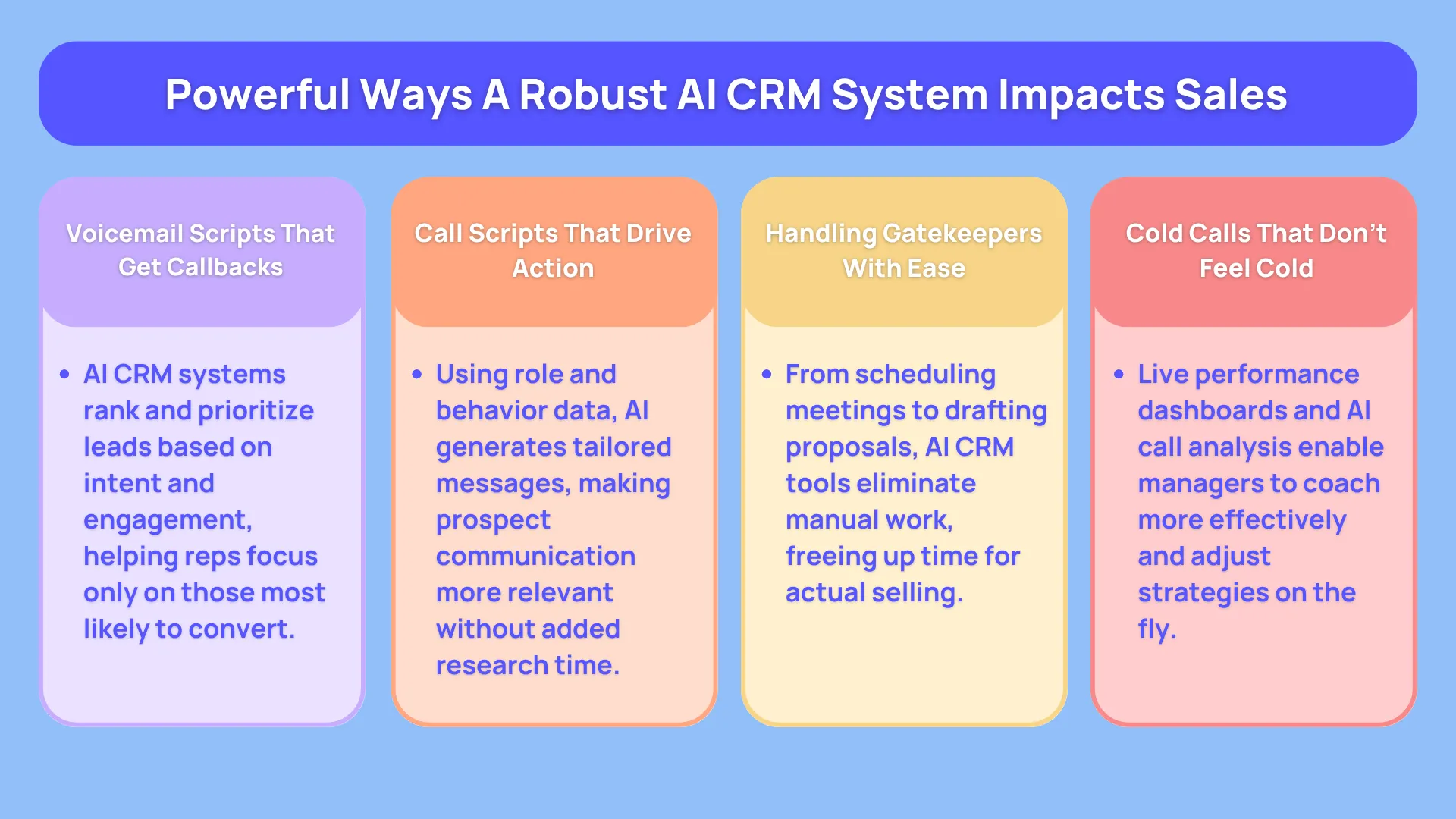
Sales teams benefit most when AI and CRM are fully aligned. Below are seven highly impactful ways AI CRM systems are transforming modern selling:
1. Intelligent Lead Prioritization
Instead of wasting time on unqualified leads, AI CRM software sorts and ranks contacts based on their intent, behavior, and engagement history. Sales reps are instantly directed toward the leads that matter most.
2. Personalized Sales Outreach
AI tools can auto-generate email drafts that align with a prospect’s role, industry, or recent activity. This helps create hyper-relevant messages without spending hours on research.
3. Calendar Automation and Scheduling
AI CRM tools can identify open slots on a rep's calendar, send availability to leads, and finalize meetings without manual input. No more email back-and-forth.
4. Performance Tracking in Real Time
AI dashboards give visibility into which reps are performing best, which deals are most likely to close, and which campaigns are working. Sales managers can respond quickly instead of waiting for end-of-month reports.
5. Enhanced Sales Coaching
Whether you’re onboarding a new hire or helping a seasoned rep improve, AI call analysis tools highlight patterns, tone shifts, and missed opportunities. This allows for personalized coaching.
6. Proposal and Content Creation
Generative AI systems now assist in drafting sales proposals, building pitch decks, and writing product comparisons. Teams can deliver polished materials in hours instead of days.
7. Accurate Pipeline Forecasting
AI CRM tools analyze historical trends and real-time rep activity to create forecasts that reflect current market conditions. That means fewer surprises during board meetings and more confidence in planning.
Enterprise-Level Benefits of AI CRM Software
For large organizations managing multiple territories, hundreds of reps, and thousands of leads, AI CRM software offers a scalable way to maintain quality and performance across the board.
- Consistent Messaging: Email automation ensures everyone stays on-brand, no matter how big the team.
- Data Hygiene: AI detects duplicate records, auto-fills missing fields, and ensures data accuracy.
- Territory Management: Smart rules route leads based on predefined criteria like vertical, geography, or company size.
- Global Dashboards: Executives can see top-level insights and drill down to team, region, or individual performance in real time.
As teams grow, the need for AI CRM platforms increases. What works for 5 reps can work for 500—if the right tools are in place.
Key Advantages of AI CRM Integration
Bringing artificial intelligence and CRM together unlocks numerous benefits that help sales teams work smarter, faster, and more effectively:
Saves Time on Routine Tasks
AI handles administrative tasks like logging calls, tracking emails, updating contact records, and creating to-do lists. That leaves more time for actual selling.
Delivers Insights Into Customer Behavior
AI customer relationship management tools look for patterns in how people interact with your brand. That means your team can:
- Predict what prospects might need next
- Understand buying cycles
- Tailor their pitches accordingly
Reduces Errors
Manual data entry is not only time-consuming but also error-prone. With AI CRM tools, data is updated automatically, reducing mistakes and improving accuracy.
Increases Conversion Rates
AI helps you reach the right person with the right message at the right time. This personalized and timely approach results in higher engagement and better conversions.
Minimizes Cart Abandonments
Especially for eCommerce sales teams, AI CRM systems can trigger smart reminders and retargeting messages based on cart behavior. That helps bring lost revenue back into the funnel.
Challenges to Address with AI CRM Implementation
Even with its potential, introducing AI-based CRM software can pose challenges that companies need to navigate thoughtfully:
Data Quality and Consistency
Garbage in, garbage out. If your CRM data is outdated or inconsistent, AI recommendations won't be helpful. Regular data cleaning and enrichment is essential.
Integration Complexities
Not all legacy systems work well with modern AI CRM tools. Enterprises may need IT support or new platforms to ensure smooth integration.
User Adoption
Some sales reps worry AI might replace their role. Training is crucial to help them see these tools as partners, not threats.
Real Examples of AI CRM in Action
LinkedIn: Smarter Account Prioritization LinkedIn developed an AI engine to help reps identify and prioritize accounts more likely to renew. The result? An 8% boost in renewal bookings through smarter targeting.
Victoria’s Secret: Personalized Email Campaigns Using an AI CRM system, the fashion retailer doubled revenue per email by sending personalized offers based on browsing and purchase history.
Retailer Chatbots: Boosting Sales During Holidays An enterprise retailer deployed AI-powered chatbots to support customers during peak season, leading to a $229B increase in global online sales.
What’s Ahead: Future of AI CRM Systems
AI CRM systems are still evolving rapidly. The next wave will focus even more on personalization, automation, and real-time intelligence. Here’s what to expect:
- Hyper-Personalized Engagement: AI will create one-to-one journeys for every customer, predicting their needs before they ask.
- Smarter Collaboration Tools: CRM and AI will help sales, marketing, and service teams stay aligned around a unified customer experience.
- Advanced Forecasting Models: Expect deeper insights into sales trends, seasonal shifts, and buyer intent signals.
- Content Intelligence: AI will assist in generating content tailored to each stage of the buyer journey, saving time and improving engagement.
Over To You…
AI CRM systems are not just tools—they're strategic assets. When CRM and artificial intelligence are paired correctly, they give sales teams the visibility, efficiency, and accuracy needed to meet modern buyer expectations.
In that sense, we'd say that whether it's scoring leads, coaching reps, or sending the perfect follow-up at just the right time, AI CRM platforms are changing how sales work from the inside out.
For any team looking to grow faster, sell smarter, and win more often, investing in the right AI CRM platform isn’t just smart—it’s essential.



